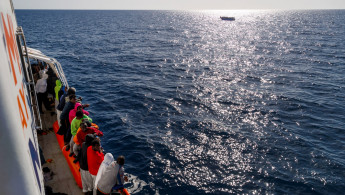Most of the 118 passengers on the charter flight from the Libyan capital to Accra were male migrant workers, but seven women, three children and two infants were also onboard, the International Organization for Migration said.
"Many of them had been working in Libya for years," IOM spokeswoman Safa Msehli told reporters at the United Nations in Geneva.
"Others had arrived in the past few years but due to the severity of the conflict and the COVID-19 situation, they found themselves out of jobs, out of income, were stranded and have decided to go home."
Some had been sleeping on the streets and were provided with shelter during the five-month halt to the IOM's voluntary humanitarian return programme.
At least 2,300 people in Libya have registered for the programme. A repatriation flight to Bangladesh is planned for September, while one due to fly to Mali next week has been put on hold due to the coup in the west African country.
The scheme is "a critical lifeline for migrants wishing to return home", said Msehli.
In the first quarter of 2020, it helped 1,466 stranded migrants return from Libya, she said.
Last year, nearly 9,800 people returned to 34 countries across Africa and Asia.
Read more: Egypt court upholds detention of student who was arrested, 'tortured' on arrival from Italy
Migration route
Libya has been in chaos ever since the 2011 overthrow and killing of dictator Moamer Kadhafi in a NATO-backed uprising, though its warring rival administrations said Friday that they would cease all hostilities and organise nationwide elections soon.
And since the ousting of Kadhafi, Libya has become a key route for irregular migration from Africa into Europe, across the Mediterranean Sea.
At least 45 migrants and refugees perished off Libya this week in the deadliest shipwreck there so far this year, the UN said on Wednesday.
The 37 rescued survivors were mainly from Senegal, Mali, Chad and Ghana.
The latest tragedy brings to 302 the known number of migrants and refugees to have perished on the Mediterranean route so far this year.
"The insecurity at the border and the lack of monitoring at the border does not allow us to have a clear idea of how many people are making their way into Libya, or how many people attempt to cross the Mediterranean," said Msehli.
"We did see many cases where hundreds of migrants were stranded or left by smugglers between the Niger and Libya border, signalling that smuggling and trafficking activity continues towards the country."
Follow us on Facebook, Twitter and Instagram to stay connected





 Follow the Middle East's top stories in English at The New Arab on Google News
Follow the Middle East's top stories in English at The New Arab on Google News
![Israeli forces ordered bombed Gaza's Jabalia, ordering residents to leave [Getty]](/sites/default/files/styles/image_330x185/public/2176418030.jpeg?h=a5f2f23a&itok=_YGZaP1z)

